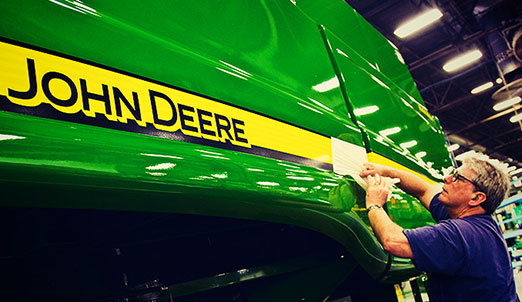We’re on track to sell more than $107 billion in farm products to foreign customers this fiscal year, according to Department of Agriculture statistics released last week. That would make 2010 the second-best year for U.S. farm exports, trailing only our showing of $115 billion in 2008. For 2011, USDA projects sales of $113 billion.
This is excellent news not only for those of us who grow crops and produce meat, but for the U.S. economy as a whole. As Secretary of Agriculture Tom Vilsack pointed out, every $1 billion in agricultural exports supports more than 8,000 jobs and generates an extra $1.4 billion in economic activity. That’s because food isn’t merely grown and harvested. It’s also processed and shipped by American workers who never set foot on farms.
President Obama certainly understands the power of an export-charged economy. Earlier this year, he promised to double U.S. exports by 2015.
Yet we can’t afford to stand still and assume that farm exports will grow like a field of corn on a hot summer day. Trade must keep up not only with foreign demand, but also with the rising tide of technology.
In the near future, I’m going to start growing at lot more food. At least that’s what the seed companies tell me. They claim that advances in breeding and genetics will allow the commercialization of seeds that yield 50 percent more food within the next decade.
Our growing world will need these new sources of food and energy because demographers expect our planet to have 9 billion inhabitants by 2050. What’s more, we must feed and fuel this burst of population in a sustainable manner. That means raising more crops on existing farmland. The alternatives include watching Brazil convert rainforests into soybean fields and tolerating an unprecedented level of global hunger.
Farmers almost always welcome technological leaps. The improved genetics of GM crops have allowed us to grow more crops even as we spend less on herbicides and pesticides. There’s an additional environmental benefit because we don’t have to till as much. This conserves fuel and prevents soil erosion.
At the same time, we’ve traditionally viewed increased production as a mixed blessing. It can provide us with the opportunity to sell more of what we grow. If everybody grows more, however, high yields can lead to poor prices as supply falls out of sync with demand. In other words, production is good but overproduction is bad.
A new generation of genetically enhanced seeds that delivers a substantial increase in yield may force us to confront a crisis of overproduction. All farmers will suffer, but the smallest farmers will pay the price first. It could force many out of business.
The solution is to guarantee long-term foreign demand for what we grow in the heartland. This shouldn’t be too difficult, given population patterns in Asia and elsewhere. China soon will pass Mexico as the second most important destination for U.S. farm exports, right behind Canada.
Yet nothing is automatic. Our competitors want a slice of this market as much as we do. The Obama administration must secure our future exports through diplomacy–and specifically by creating favorable trade conditions for American-made products.
This means coming into full compliance with NAFTA, which requires the United States to permit Mexican long-haul truckers who meet US safety standards to travel our highways (a 2003-2006 DOT study found that Mexican carriers in the US had a better safety record than U.S. Carriers). By refusing to take this step, the United States has opened itself to Mexico’s fully justifiable retaliation. Its latest round of sanctions will cost farmers and manufacturers about $2.5 billion over the next year.
The White House also must push ahead with three free-trade agreements that have been completed but continue to languish in Congress. The pacts with Colombia, Panama, and South Korea will help secure the future of farm exports in countries whose combined population is nearly 100 million.
American farmers will do their part, continuing to grow the food the world needs. Now Washington must make sure we can sell it.
Bill Horan grows corn, soybeans and grains in Northwest Iowa. This fourth generation family farm has been involved in specialty crop production and identity preservation for over 20 years. Mr. Horan volunteers as a Truth About Trade & Technology Board member. www.truthabouttrade.org

